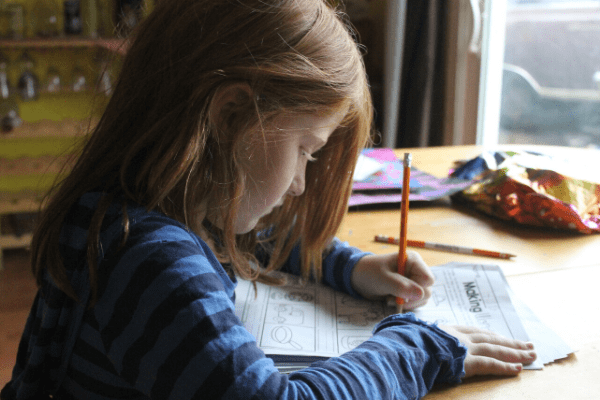During this time of uncertainty, it is hard to know which way is up. Ways of life have turned upside down, including in our careers and education. Schools everywhere are required to close for an unknown amount of time but of course learning has not closed. Teachers and students everywhere must find a new normal with distant learning. Parent and guardian support is needed now more than ever to support children with their continued success. In the last week, many of my clients have reached out to me for tips on how best to continue their child’s education from home (while maintaining their sanity). I let them know that a child’s routine and environment at school is never going to be 100% replicated; however, we can take small steps in creating a ‘classroom’ at home. There are even some benefits that come from learning at home that can greatly aid your children in their development. Here are my top 10 tips for learning at home.
- Building a routine with your child is key. Try not to let your children sleep in too late, have some sort of breakfast and start your day. Jumping right into an activity that stimulates the mind will help set your children on the right path for the day. Maybe that is reading a book, counting toy cars, or practicing handwriting by writing out the goals for the day on a white board. Start your child’s day as if they were at school–take learning breaks throughout the day, have recess at home! Schedule time for lunch and a snack. Complete another academic activity and then switch it up. Provide activities that help your child burn energy, jumping jacks, run in place share yoga etc. Cut academic learning time off by dinner and just spend time together as a family. Sleep and repeat!
- It will not always go according to plan. That is okay! This is an adjustment for everybody, and your children may be impacted by the transition even more than they let on. Just take it day by day, and if something’s not working, don’t be afraid to change course and try something different. But building breaks and breathing space into the day will help everyone not get too stressed.
- It may seem like a daunting task to fill the whole day with activities, but there are resources available. Like anything, moderation is key. Electronics are a fabulous tool but not all day long. Schedule time in your day where your child can go on free sites such as, ABCya.com, BrainPop.com or newsela.com. Check out this compiled list of hundreds of free online resources available during this uneasy time! Your child may even be familiar with some of these!
- If you can, take your learning outside! Use sidewalk chalk to practice writing letters and numbers, walk on the cement lines to build balance, or categorize the moving cars.
- Use what you have around you. You don’t need elaborate lessons to continue your child’s success. Draw lines on paper and have your child cut on the lines, fold blankets to practice fractions, or write a letter to a family member or friend and mail it. Your home is filled with learning tools!
- Don’t be surprised by the big questions that may arise. Your children may be spending more time with you than they usually do, which leaves more opportunities for them to talk with you, and to ask you questions about you, your family, and life in general. Don’t shy away from these moments—instead, try to embrace them and answer as truthfully as you can. There are many resources out there to help you tackle some of the issues that may arise. If they are inquiring about their adoption story, you may find some of these books and articles helpful.
- Most importantly take this time to teach your child something new or strengthen a taught skill. Allow your child to measure out the ingredients when baking cookies. Have your child count the place settings while setting the dinner table. Incorporate chores and build responsibility in your children.
- Allow your child to be a kid! Try to get fresh air every day, whether that is going for a hike or sitting on a balcony. It is important for your child to take breaks and decompress.
- Take it one day at a time as we all adjust to this new normal. This too shall pass, and we will look back and think about how happy we are that we got to spend that extra time with our children.
- Don’t forget that we are here for you! Spence-Chapin’s clinical team offers virtual coaching sessions to support those connected to adoption. Contact us at (646) 539-2167 or [email protected] to learn how we can help.
Mark Lacava currently serves as Chief Clinical Officer (CCO), Pre and Post Adoption Services at Spence-Chapin. Mark manages the counseling staff, oversees Spence-Chapin’s counseling, support services, community programming, and professional trainings. Mark has over 20 years of experience working with children and families as a licensed clinical social worker. Mark uses his extensive experience to provide families not only with counseling, but with practical skills and tools to improve their daily lives. Mark trained at the prestigious Ackerman Institute for Families. He is also trained in Trauma-Focused Cognitive Behavioral Therapy and Dyadic Developmental Psychotherapy. His work in Child Welfare and at Spence-Chapin is based on how trauma affects brain development and behavior. At Spence-Chapin, Mark continues his personal mission to promote the needs of children, families, and LGBTQ individuals.






